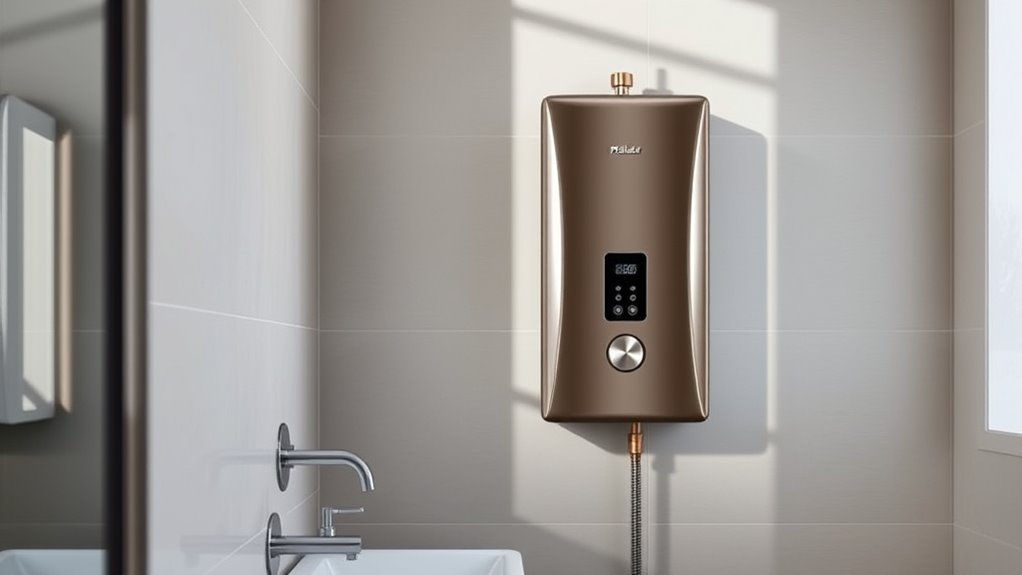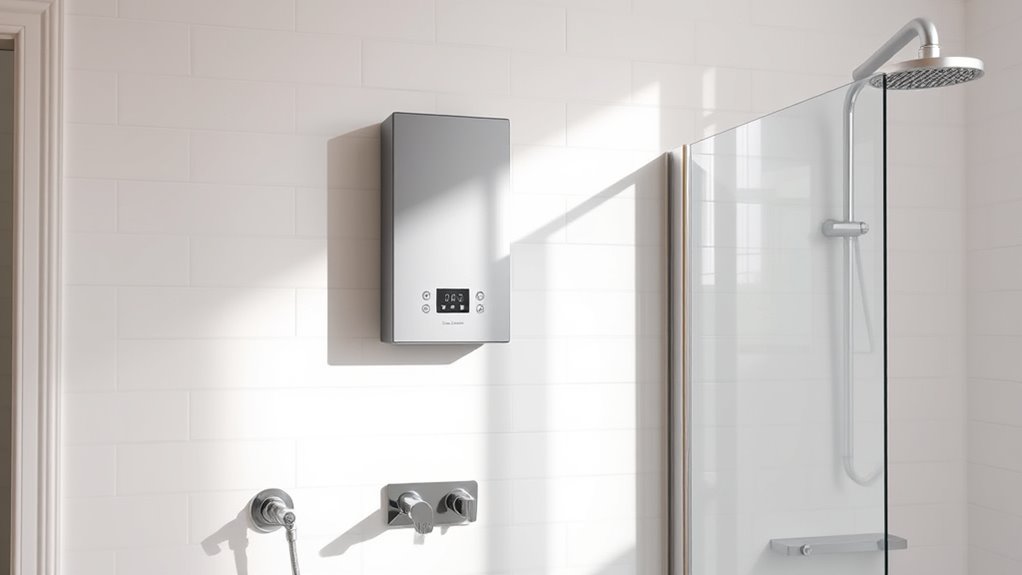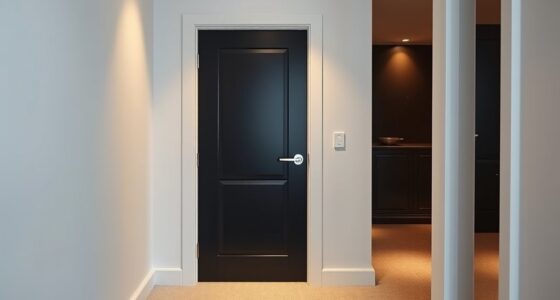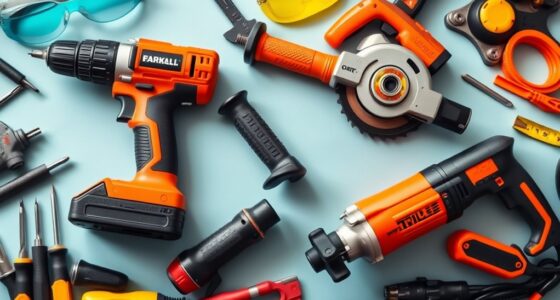Tankless water heaters are a great choice if you want to save space and reduce energy bills. They heat water on demand, which means no standby losses, and their compact design frees up room in your home. However, they may not provide enough hot water for multiple fixtures at once, especially if you have a larger household. If you’re curious about whether a tankless heater suits your needs, exploring the details can help you make a smart decision.
Key Takeaways
- Ideal for small households with low hot water demands, offering energy savings and space efficiency.
- Suitable if you prioritize modern aesthetics and want to maximize living space with wall-mounted units.
- Best for homes where consistent hot water flow isn’t needed for multiple fixtures simultaneously.
- Consider if you’re prepared for potentially higher installation costs and regular maintenance, especially in hard water areas.
- A good choice if safety, energy efficiency, and environmental benefits are top priorities for your household.

Tankless water heaters are an innovative solution for providing hot water on demand while saving space and energy. If you’re tired of bulky tanks taking up valuable space or facing rising energy bills, a tankless system might be just what you need. These units are designed to be mounted on the wall, taking up to 80% less space than traditional tanked heaters, giving you more room for other essentials or aesthetic improvements. Their sleek, modern appearance can blend seamlessly into your home’s decor, making them an attractive upgrade.
One of the biggest advantages is energy efficiency. Because tankless heaters only heat water when you need it, they reduce standby energy losses common with traditional models. For homes that use 41 gallons or less of hot water daily, these units can be 24% to 34% more efficient, leading to noticeable savings on your utility bills. A typical household could see savings of around $1800 over several years, making the initial investment worthwhile. Many models also carry Energy Star certification, ensuring you’re choosing a highly efficient appliance that benefits both your wallet and the environment. Energy-efficient operation can lead to significant long-term savings and a smaller carbon footprint.
Tankless heaters can boost efficiency by 24% to 34%, saving you money over time and benefiting the environment.
However, there are some considerations to keep in mind. Tankless water heaters provide hot water at a flow rate of 2–5 gallons per minute, which may not be enough if multiple fixtures are running simultaneously. For larger households or homes with high hot water demands, gas-fired models offer higher flow rates than electric ones. Installation can be more complex and costly, as proper venting and additional components might be necessary to prevent mineral buildup and scale issues, especially if you live in an area with hard water. While the upfront cost is higher than traditional units, their longer lifespan—often 15 to 20 years with regular maintenance—can offset initial expenses. Additionally, system capacity should be carefully considered to meet your household’s hot water needs effectively.
Safety features are built into these systems, including certifications like CSA, automatic shut-offs, and low NOx emissions to reduce pollution. They’re designed to operate safely, with built-in controls monitoring water and exhaust temperatures. Maintenance is generally less demanding, but regular checks are recommended, especially in hard water areas where mineral deposits can accumulate. Using scale prevention products can extend the lifespan and performance of your unit.
If you have limited space, want to reduce energy consumption, and are prepared for a potentially higher initial investment, a tankless water heater could be an excellent choice. They fit well in modern homes, offer continuous hot water, and support long-term savings and environmental benefits. But if your household’s hot water needs are high or you prefer a simple, straightforward installation, weighing these factors carefully will help determine if they’re right for you.
Frequently Asked Questions
How Long Do Tankless Water Heaters Typically Last?
Tankless water heaters typically last between 15 and 20 years, with some reaching up to 25 years with proper maintenance. You can extend their lifespan by regularly flushing and cleaning them, especially if you have hard water. High-quality materials like stainless steel also help. Proper installation and water treatment are essential. While they cost more upfront, their durability and efficiency make them a smart long-term investment.
Are Tankless Water Heaters Suitable for Large Families?
Tankless water heaters suit large families because they provide endless hot water on demand, saving space and energy. You can install multiple units to handle high simultaneous usage, ensuring everyone gets hot water when needed. While initial costs are higher, long-term savings on utility bills make them a smart choice. Proper sizing and professional installation are key to meeting your family’s hot water needs efficiently.
Do Tankless Models Require Special Electrical Wiring?
Tankless models do require special electrical wiring. You’ll need a dedicated circuit with the correct breaker size—often 60-amp double-pole or up to two 40- to 70-amp breakers for larger units. The wiring should be appropriately gauged, usually 6-gauge copper, and may need to run from a sub-panel if multiple circuits are involved. Always follow manufacturer instructions and local codes, and consider professional installation for safety and compliance.
Can I Install a Tankless Water Heater Myself?
Back in the days of dial-up internet, installing a tankless water heater might’ve seemed like a formidable task. Today, you might wonder if you can do it yourself. While some handy folks with electrical and plumbing skills can handle it, most installations require specialized tools, proper venting, and adherence to local codes. For safety, efficiency, and warranty reasons, hiring a professional is often the best choice.
What Is the Average Cost Comparison With Traditional Heaters?
You’re wondering how the costs of tankless water heaters compare to traditional ones. On average, tankless models cost between $1,398 and $3,894, with installation adding another $500 to $1,500. Traditional tank heaters are usually cheaper upfront but can cost more to operate over time. While tankless units have higher initial costs, they last longer, save energy, and require less maintenance, making them a smart long-term investment.
Conclusion
Thinking about upgrading? You might find that a tankless water heater fits your lifestyle perfectly, saving space and energy. Sometimes, the perfect solution appears just when you least expect it, like a long-lost key turning up right when you need it most. If you’re ready for a change, this upgrade could be that happy coincidence, making your daily routine smoother and more efficient. Sometimes, the right choice finds you when you’re not even looking for it.








